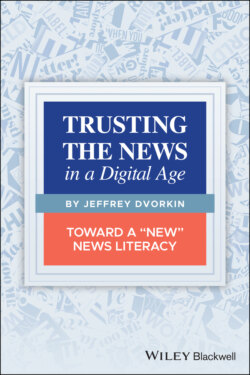Читать книгу Trusting the News in a Digital Age - Jeffrey Dvorkin - Страница 16
How the News Happens Now
ОглавлениеBut it has not been entirely negative. For journalism, there has been a range of enormous benefits: the ability to connect and to see, hear, and feel what's happening both nearby and far away has truly made our media lives feel as though we live in a global village. We can better understand what life is like (or should be like) in an African village, in an Indian city, in an Indigenous community, in a small town going through massive unemployment. The world and its people are now immediate and available to us in a way that they never were before.
To put it in scientific terms, the Internet delivered the prospect of experiencing life centrifugally. That is to say, in ever‐widening and constantly expanding terms that allow us to better understand what it means to be truly human. This is where the information consumer can find both “surprise” and “delight.” This is the original promise that the Internet made available. If we want it.
At the same time, an opposite tendency is emerging: a centripetal force, which, like an informational whirlpool, pulls us into smaller and smaller comfort zones of recognizable facts and feelings. It disconnects us from that larger world that the Internet promised to deliver. It is a safer way to experience the Internet.
At a time of “informational overload” from the news, many people say they are experiencing a form of “compassion fatigue.” This is the sense that the world and its numerous problems are too much to bear, and that people need to seek relief and escape from the news. This results in the inundation of cat videos, personality quizzes, celebrity news, junk mail, and pornography. These things are made increasingly available through “clickbait,” by which many media, both mainstream and non‐mainstream, try everything to regain the audience (and customers) that have been dispersed by the Internet. “Clickbait” teases and tempts the audience into clicking on a picture or a headline that may promise more (or less) than it should. We'll explore that, too.
News literacy gives us a way of resisting the less‐than‐useful tendencies of modern journalism. It provides the intellectual challenges that can show us why some news is reliable while other news is not.
